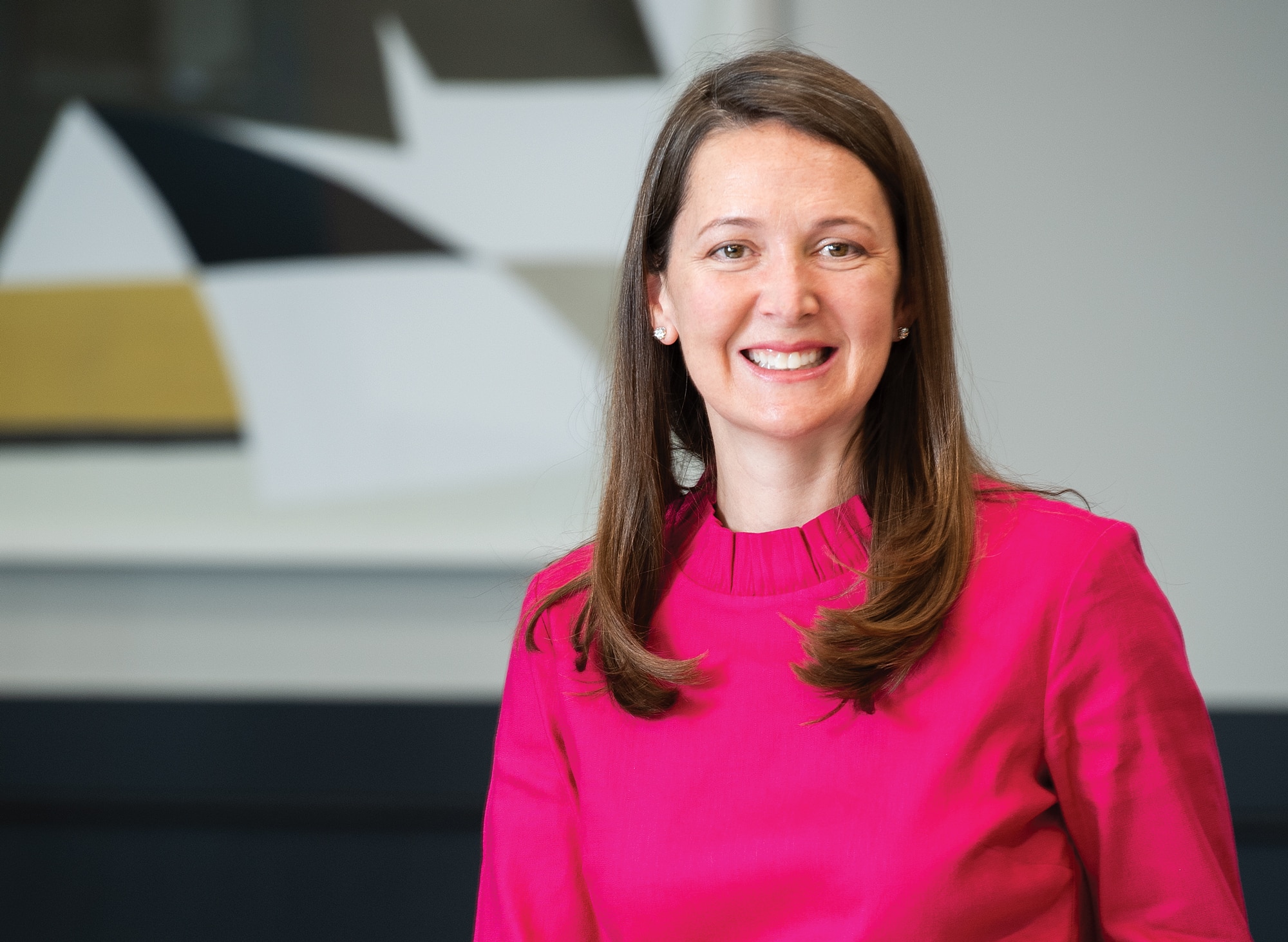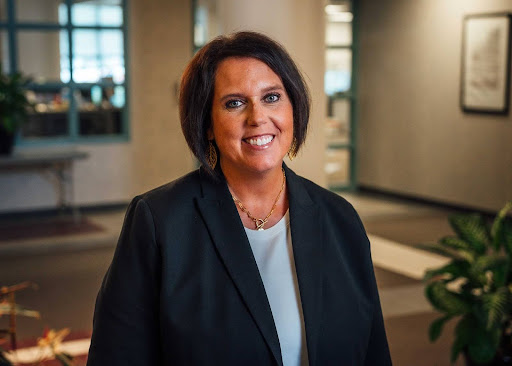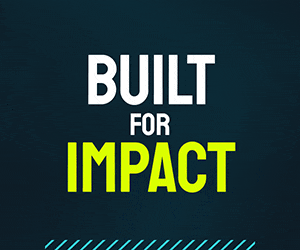ManchesterStory’s Nicole Gunderson shares her steps from investment banking to working with startups and venture capital

Sarah Diehn Mar 15, 2024 | 6:00 am
11 min read time
2,621 wordsAll Latest News, Banking and Finance, Business Record Insider, Innovation and Entrepreneurship, InsuranceLike many students, Nicole Gunderson entered college not knowing what career she would land in.
“When I started at the University of Iowa … all I really knew was that I wanted to do ‘business.’ I didn’t have a very clear direction when I started.”
She found her way to finance but has since ventured into different branches of the industry. She entered the venture capital field when she joined Des Moines-based firm ManchesterStory in 2022.
Reflecting on her career so far, Gunderson shared that each new role has built on her past experience while pushing her outside her comfort zone.
Her first experience with this was diving into the startup world and joining Des Moines-based fintech startup Dwolla.
“I wasn’t sure if I was going to thrive in a startup environment where the playbook has not been written for you and you really have to chart that course — it turns out I loved it,” Gunderson said.
She said her first role as an investment banker with BMO Capital Markets provided the fundamental training that helped her migrate to other areas within the financial industry. At Dwolla, she started as an intern as part of her MBA program and moved up through several roles to ultimately leading the company’s sales organization and strategy.
She had inclinations toward entrepreneurship and innovation throughout her life, from growing up learning to count change while working at her parents’ small business to working with Richard L. Sandor as he prepared to launch the Chicago Climate Exchange.
Gunderson’s next steps immersed her in the entrepreneurs’ side of building an early-stage startup and working with investors, which she said has helped her empathize with the new founders she’s meeting.
For several years, she was with a Chicago-based startup, helping develop its go-to-market strategy. But it wasn’t too long until her home state recruited her back to lead the Global Insurance Accelerator (GIA) and work with both early-stage startups and leading insurance companies in Des Moines.
“[The GIA] was my entry into the insurance and insurtech world, but what was really exciting for me about that was it allowed me to bring together various sets of my prior career experience,” she said.
Since joining ManchesterStory in 2022, Gunderson has embraced her diverse knowledge and insights as she enters the venture capital sphere full time and seeks out entrepreneurs building emerging fintech and insurtech startups across the country.
The Business Record recently caught up with Gunderson to recap her 20-year career and get a peek into her new role.
This Q&A has been lightly edited and condensed for clarity.
How did the opportunity to work at ManchesterStory come up?
I often think the timing of things in life really matters, whether that’s your career decisions or, in my case, ManchesterStory. [It was] started by the two co-founding partners, Dave Miles and Matt Kinley, in 2017, but when I started talking to them, it was a point in time where they too were looking to grow, so it really opened the door for them to be able to bring on a new investment professional. ManchesterStory is focused on investing in insurtech, fintech and health tech companies, and given my background, it was a really strongly aligned opportunity for me to continue to build on what I had just done with the GIA the prior four years, learning about and investing in the insurtech space. But also I was interested in getting back to some of the fintech work that I had previously done. Part of my coming here is that I get to spend more time looking at the fintech vertical. It’s been really fun because, in a way, I’ve been able to reengage and reconnect with so many of my relationships, dating back to the start of my career at BMO through my time at Wharton and with Dwolla. I love being able to reengage in those relationships. I came on as a principal of the firm, and part of my opportunity here is to find the emerging companies that are ultimately going to be raising capital that we can look to partner with.
What made it the right time to take this next step in your career?
Similarly with what made the GIA very interesting at that point in my career, ManchesterStory was the next step in really getting to use so much of what I had just done at the GIA but on an entirely different level. That’s specifically what ManchesterStory is focused on, investing in early-stage companies, and I love working with the entrepreneurs, finding those founders that we want back. A big part of what we do is to bring our expertise and network to bear to help them be successful.
How did your past experiences help you as you took over leadership of the GIA?
At the GIA, we made investments into each of the startups that participate in the program, so that was an opportunity for me to do more of that. I was working with entrepreneurs who are building these companies from the earliest stage and I had been, not my own company, but I had been on the early side in a tech company helping to build it, and I really enjoyed being able to help these entrepreneurs. The last piece and a really important one is that the incredible model of the GIA is it’s these large insurance carriers who provide the backing and support of the program. As the leader of the GIA, I also had to work with them and understand what was important to them about their participation and helping these startups, who are building insurance technologies, serving the insurance industry [to think about] how do you work with a large institution? That was a lot of what I had done previously at Dwolla. We were selling into financial institutions, into the government at a point in time, so I was really able to use that experience to help both the startups and the GIA program navigate that, as well as, it was a point in time where carriers were still figuring out their innovation strategies and how do you work with a small company? And it was through that career experience that I met the ManchesterStory team.
What is ManchesterStory’s operating model and investment philosophy?
What I appreciate about ManchesterStory and its model is being focused on industries [and] being more specialized versus a generalist investor works really well for us because then we can really get to understand these spaces and problem sets on a deeper level. Then we find that we are more valuable, ultimately, to the companies that we partner with. I think of it as two sides where we have investors who we call limited partners, and we think of them as strategic partners because they’re largely coming from the insurance industry: insurance carriers, insurance brokers and wholesalers. They are providing the capital that we get to invest. We’re also strategic partners to them, and so when they might come to us and say, “We’re really trying to understand everything that’s going on in artificial intelligence, what are you guys seeing for companies who are really focused on problem-solving for the insurance industry?” We’re able to then take a step back and look at the space. Who are the companies that we know? Maybe, who haven’t we met with yet, so we can do some more work there and then help them to be able to say, “OK, these are the ones that we know.” We spend time helping them with their own evaluation of insurtech solutions, so that specialization that we bring I think is valuable on that level.
When I think more about the criteria for how we’re choosing the companies that we’re investing in, it is at that broadest level. We say insurtech, fintech, health tech, those adjacent industries, but when we get into them more deeply, some of the criteria are they have to be at that early stage where they’re raising capital. We think that’s a good point for us to be able to help these companies. There’s a lot of room to grow from there but as we get deeper into our criteria, we look a lot at certainly understanding the problem set and the market that that problem is solving for. An important factor for us too, though, is that founder or founding team and do they have the sets of experiences prior to starting this company that lend additional credibility to why they really might be the person who can build a great company. Because it’s hard. We know that a lot of times what we invest in initially may not exactly be what the company is doing two, three, four years from now, so is that team the one that is so well positioned to be able to solve and pivot? We spend a lot of time getting to know not just the company and what it’s doing, but the team that’s behind it.
What is ManchesterStory’s outlook on venture capital and emerging trends among insurtech and fintech companies right now?
I think we’re all excited about 2024. 2023 was a more challenging investment environment both for us as an investor as well as the startups seeking investment. I think there will continue to be some challenges for companies in 2024, and part of the way that we operate is [that] we’re providing a lot of support for our portfolio companies, so we spent a lot of time and continue to spend a lot of time doing what we can to set the portfolio companies up for success. I think many have fared very well through a difficult environment so that’s been important from a 2023-going-into-2024 perspective. We’re excited, broadly, to see there continue to be tremendous companies being built by great people in the industry and we’re still very bullish on the areas that we focus on. I think what else will continue to be interesting for 2024, even into 2025, is navigating this environment of more mergers and acquisitions activity by the industry. Instead of building some functions, they might buy these companies and I think that more of that activity will be happening in 2024 and 2025.
In terms of the areas companies are focusing on, definitely AI [with] how that has really advanced some of the solutions of companies that we’ve known, even before. They were using machine learning inside of their solutions, but what they can do now because of the accelerated advancement — we’re really paying attention to every company that we meet in terms of what does that mean for that company. I think that is broad because automation as an example impacts back end and front end. Back end from an operations perspective inside of the insurance company, so what types of solutions are helping to automate processes from underwriting to claims? The front end is more that customer experience, so we look at, I would say, everything across that spectrum. We’re looking at what is AI’s continued impact. I think we like those companies where they are focused on a vertical rather than just an AI solution that any industry could use because, again, it’s nuanced. Insurance is nuanced, financial services is nuanced, health care is nuanced, and they’re all regulated. So knowing that the solutions are really keyed into that is important to us.
In May 2023, BrokerTech Ventures announced the BrokerTech Fund, a new insurtech venture fund that ManchesterStory is managing. Could you share an update on that fund?
It’s a great partnership, and we continue to be really excited about it. What it does for us is we have great limited partners for these strategic partners coming from that industry. I would say that as they had already invested in putting together BrokerTech Ventures that includes the accelerator. These are folks who are really interested in innovation that’s impacting their industry and finding solutions and tools for brokers and agents. Now at ManchesterStory, we get to continue to build on their interest by bringing the more traditional investment approach to that concentration. We already were a part of a broad pipeline of insurtech companies that we get to meet and attract; now we’re continuing to spend more time further looking for and finding those types of more broker-centric solutions.
We have made a few investments so far that have not been announced as a part of the BrokerTech Fund that we’re managing, but I would say everyone from ManchesterStory to the partners continues to be really excited by this focus. It’s very attractive to an insurtech company whose focus is in and around that distribution space because people who really get [the industry] is a differentiator, so we can help them advance their business by just having the reach of that network. I would say that it’s that wonderful two-way street. We benefit from the knowledge that our partners have because they’re in that business day in and day out, and then we help bring to light companies that are building solutions in their space that they may not yet be aware of.
What is one of your biggest lessons from this role since starting or a way you’ve grown?
I think it can be really easy to be critical, and I think women in particular are guilty of this, where instead of questioning, do I have a certain set of experiences? I’ve been really focused in this role at ManchesterStory on continuing to bring to the experience all the sets of experiences that I’ve had. While I do not have a traditional venture capital career, in most of the conversations that I get to have, whether it’s internally as we’re discussing and evaluating an opportunity or with the founders that I get to meet, having been in operational roles inside of an emerging tech startup, I have firsthand experience, but I also have empathy. I think if you haven’t been in that seat, it’s easy to lose sight of. I have to remind myself about what do I bring on a daily basis that helps us as a firm be a better investor instead of being like, “Oh, I really wish I had had that experience.” I can keep learning. But this industry, in a positive way, I think it’s moved away from [having] to grow up in venture capital to do venture capital, and instead, having been in an operator role or having done some version of investing. I’ve focused, as I’m finding my place in the firm and in the industry, where I can really bring value to our day-to-day.
What are your hopes for Iowa’s entrepreneurial ecosystem and specifically the insurtech and fintech sectors where you have been involved?
As the walls continue to come down for where a tech company “needs” to be built, the playing field has been leveled, and I would love to continue to see more companies in the insurtech and fintech spaces start their businesses here or grow their businesses here because there is a rich field of professionals to draw from. And for us as investors, it would be great to have more that are even here locally. While it’s not a requirement, it would be great. I think there’s a lot of people, us included, that when we’re outside the state of Iowa, we’re continuing to tell that story about why you can build a great company and build a great life in the state. I think it’s never done alone, but there’s a lot of people who are trying to do that work. I hope we can continue to see that grow in the coming years.

Sarah Diehn
Sarah Diehn is editor at Business Record. She covers innovation and entrepreneurship, manufacturing, insurance, and energy.











